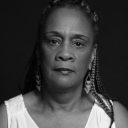I was raised by my grandmother. She was a faithful woman, very involved in the church. Some of my earliest memories are of memorizing poems and bible verses to read to folks. I was preparing for the stage early.
I wanted to graduate high school and go straight to college. We couldn’t afford that, so myself and a friend decided to look for summer jobs. That was before the Internet so we had the want ads and the bulk of what we found was Dancers Needed to Make Big Money, and things like that. We were young and it wasn’t like we didn’t like to dance. And those ads said we could make $1,000 a week! We went in and were hired on the spot.
They weren’t really looking for dancers. It was an ad for stripping. If we even tried to really dance they told us we had to be more sexy and seductive.
The more things change, the more they stay the same. Back then dancing was the stepping-stone to prostitution. Today it’s still the same. Modelling, dancing – it’s almost never what they tell girls it’s gonna be.
I was able to escape after a year. But during that time, my life had become so messed up. I had so much healing to do after I got out.
I lost contact with the friend who went in with me. Years later I ran into her by coincidence and I asked her when she got out. She told me that it was when her “boyfriend” (who was actually her pimp) had died, which was about one year earlier. At that time we were both in our fifties.
I could have been her. But maybe with the right help, she could have been me.
Life does not go the way you think it will. I never did go to college. That probably says something about how one year in life can make it hard to get back on your path. But it was because of my personal experiences that I founded Breaking Free. We were the first program in the nation to provide permanent housing for prostituted women and their children. Twenty years later, we are still doing it.
There are so many hurt and dying women caught up in this life. Helping them see their value and recognize that they are worth saving is my mission. That matters as much as getting a roof over their heads.
Prostitution is a racial justice issue. The slave era is where sex trafficking began for African American women. Even after slaves were free, black women and girls were still being bought and sold. Today there are too many poor urban areas that middle-class men drive through for the sole purpose of finding a woman or girl of colour to buy or use. You just can’t take race out of it.
I kept my own story in for a long time. Years and years after it happened, I wrote down what had happened to me during that time, and shared it with my children. The way they reacted told me how painful it was, even though a part of me had tried to forget that. Something about their understanding made me feel like I should keep sharing.
I love my work. I believe in my work. But I am more than my work. I’m getting near retirement, and the other day someone said to me ‘Vednita, what are you gonna do if you’re not working at Breaking Free?’ And that took me aback. Because as important as what I do is, it’s not the only thing I am. There are all of these other aspects to me.
The truth is. I’m just getting started. Let’s not mince words. Prostitution is a racial justice issue. It is a gender and an economic justice issue. It is a legacy of slavery and patriarchy. It is not progressive. It is not humane. There is so much we all can do to create a world where it is not considered inevitable or normal for men with means to feel entitled to buy sex from more vulnerable populations.
And more philanthropy is needed! Please look for ways to support organisations like my own which are helping survivors to break free and rebuild their lives.
This article was originally published by the World Without Explotation’s The Voices & Faces Project. It is being re-published in Alliance with permission.
Vednita Carter is the founder and former president of Breaking Free, a non-profit agency helping women and girls escape systems of prostitution and sexual exploitation through advocacy, direct services, housing, and education.






Comments (0)